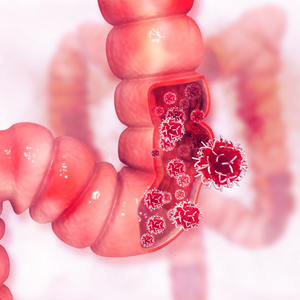Rectal Cancer

Rectal cancer is cancer that develops in the rectum. Changes or mutations in the DNA of healthy rectal lining cells leads to polyp formation and eventual transformation to rectal cancer.
While rectal cancer is similar to colon cancer on a cellular level, treatment can differ significantly as the rectum is surrounded by other organs in a tight space adding complexity in the ways it spreads and the surgical challenges in a confined space.
Symptoms
- Change in bowel habits:
- Diarrhea.
- Constipation.
- Change in stool caliber.
- Incomplete evacuation of the rectum.
- Blood in the stools.
- Anemia.
- Lower abdominal pain or pelvic pain.
- Weight loss.
- Fatigue or tiredness.
The outcome of rectal cancer is determined by the stage of the cancer. Stage of the cancer depends on several factors including the extent of the growth of the cancer thru the wall of the rectum, spread to lymph nodes, surrounding organs and other distant organs such as liver and lungs.
Staging of the tumor includes assessment of the extent of growth into the rectal wall, lymph nodes, nearby organs or other more distant organs such as the liver and lungs.
- Local staging is determined by:
- Endoscopic ultrasound exam of the rectum.
- MRI of the pelvis.
- Spread to other distant organs is determined by:
- CT scan of the abdomen and chest.
- PET scan.
Treatment
The goal of treatment is to cut and remove the tissue containing the cancer cells. Depending on the stage, surgery may be the initial option or performed after shrinking the tumor with chemotherapy and radiation treatments. After surgery, chemotherapy and radiation therapy may be used to kill any cancer cells that remain and reduce the risk that cancer will return.
FAQs
Rectal cancer is a type of cancer that occurs in the rectum, which is the last several inches of the large intestine leading to the anus. It is often referred to as colorectal cancer, as it is a type of cancer that affects the colon and rectum.
Symptoms of rectal cancer can include rectal bleeding, a change in bowel habits (such as diarrhea or constipation), abdominal pain or discomfort, and a feeling of incomplete bowel evacuation. Some people may also experience weight loss, fatigue, or anemia.
The exact cause of rectal cancer is not fully understood, but certain factors may increase the risk of developing the disease. These include a family history of colorectal cancer, a personal history of polyps (abnormal growths in the colon or rectum), a diet high in red or processed meats, and a sedentary lifestyle.
Rectal cancer is usually diagnosed through a combination of a physical examination, a procedure called a colonoscopy, in which a long, flexible tube with a camera on the end is inserted into the rectum to examine the inside of the colon and rectum and imaging tests (such as a CT scan or MRI).
The specific treatment plan will depend on the stage of the cancer and the patient’s overall health. Depending on the stage, surgery may be the initial option or performed after shrinking the tumor with chemotherapy and radiation treatments. After surgery, chemotherapy and radiation therapy may be used to kill any cancer cells that remain and reduce the risk that cancer will return.
There is no sure way to prevent rectal cancer, but certain measures may reduce the risk of developing the disease. These include maintaining a healthy diet and lifestyle, getting regular screenings for colorectal cancer, and avoiding tobacco and excessive alcohol consumption.
Rectal cancer is typically staged using the TNM staging system, which takes into account the degree of growth tumor (T) thru the wall of the rectum, the extent of spread to nearby lymph nodes (N), and the presence of distant metastases (M). Staging is done by Colonoscopy, endoscopic ultrasound, CT scan PET scan and MRI.